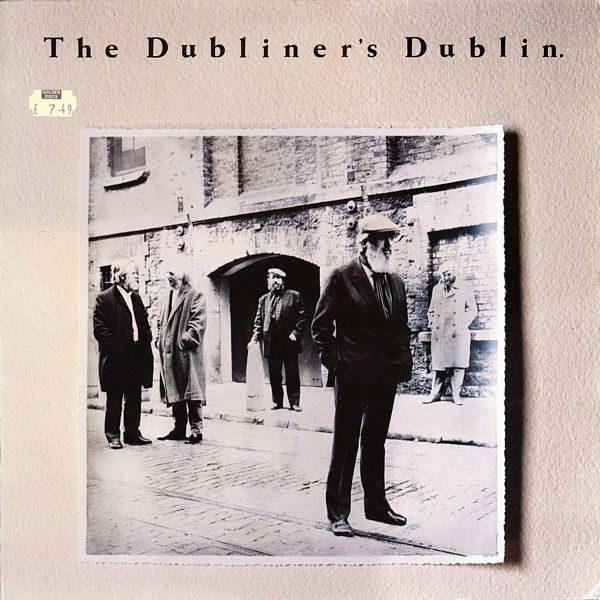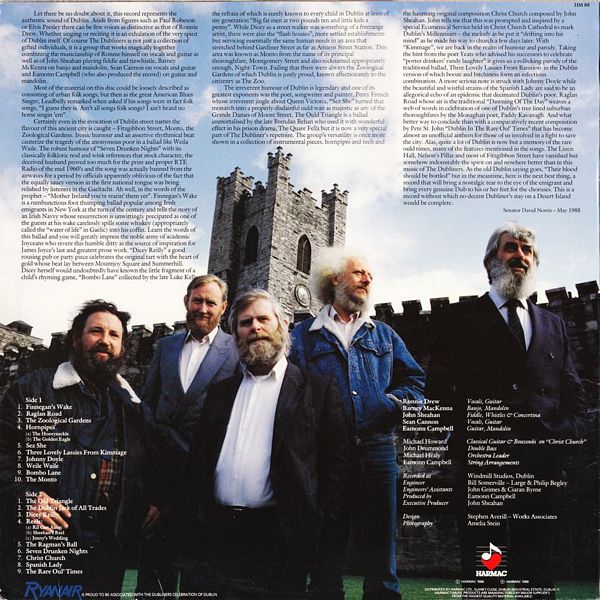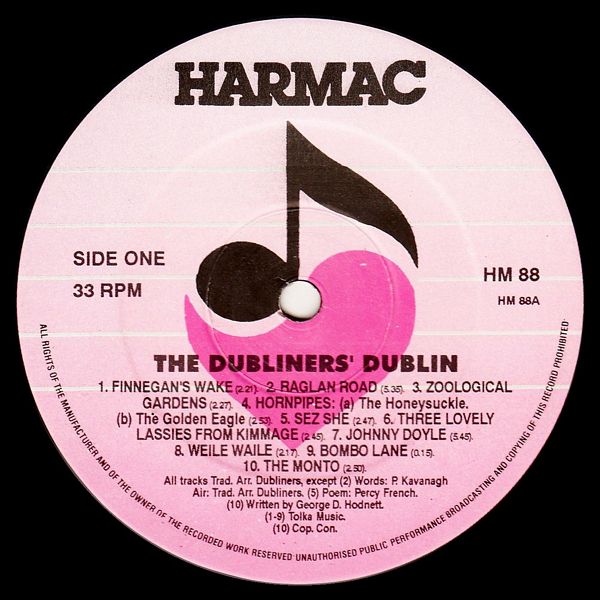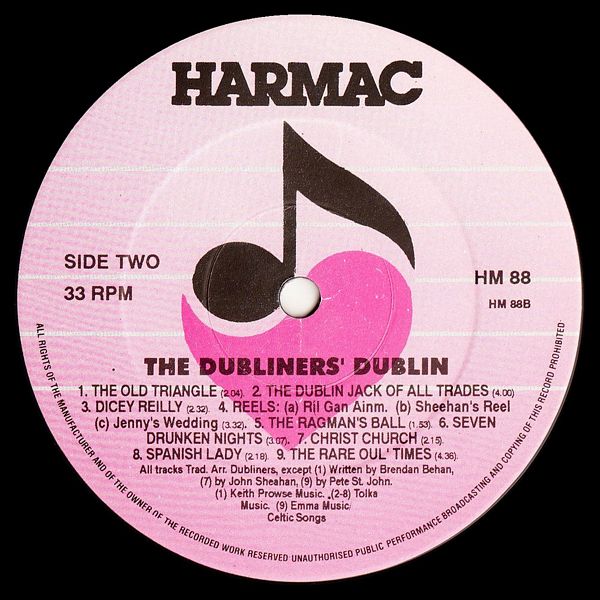

 |


 |
Sleeve Notes
Let there be no doubt about it, this record represents the authentic sound of Dublin. Aside from figures such as Paul Robeson or Elvis Presley there can be few voices as distinctive as that of Ronnie Drew. Whether singing or reciting it is an exhalation of the very spirit of Dublin itself. Of course The Dubliners is not just a collection of gifted individuals, it is a group that works magically together combining the musicianship of Ronnie himself on vocals and guitar as well as of John Sheahan playing fiddle and tin whistle, Barney McKenna on banjo and mandolin, Seán Cannon on vocals and guitar and Eamonn Campbell (who also produced the record) on guitar and mandolin.
Most of the material on this disc could be loosely described as consisting of urban folk songs, but then as the great American Blues Singer, Leadbelly remarked when asked if his songs were in fact folk songs, "I guess they is. Ain't all songs folk songs? I ain't heard no horse singin 'em".
Certainly, even in the evocation of Dublin street names the flavour of this ancient city is caught — Fitzgibbon Street, Monto, the Zoological Gardens. Ironic humour and an assertive rhythmical beat cauterize the tragedy of the anonymous poor in a ballad like Weila Waile. The robust humour of "Seven Drunken Nights" with its classically folkloric nod and wink references that stock character, the deceived husband proved too much for the prim and proper RTE Radio of the mid 1960's and the song was actually banned from the airwaves for a period by officials apparently oblivious of the fact that the equally saucy version in the first national tongue was being relished by listeners in the Gaeltacht. Ah well, in the words of the prophet — "Mother Ireland you're rearin' them yet". Finnegan's Wake is a rambunctious foot thumping ballad popular among Irish emigrants in New York at the turn of the century and tells the story of an Irish Navvy whose resurrection is unwittingly precipitated as one of the guests at his wake carelessly spills some whiskey (appropriately called the "water of life" in Gaelic) into his coffin. Learn the words of this ballad and you will greatly impress the noble army of academic Joyceans who revere this humble ditty' as the source of inspiration for James Joyce's last and greatest prose work. "Dicey Reilly" a good rousing pub or party' piece celebrates the original tart with the heart of gold whose beat lay between Mountjoy Square and Summerhill.
Dicey herself would undoubtedly have known the little fragment of a child's rhyming game, "Bombo Lane" collected by the late Luke Kelly the refrain of which is surely known to every child in Dublin at least of my generation "Big fat men at two pounds ten and little kids a penny". While Dicey as a street walker was something of a free-range artist, there were also the "flash houses", more settled establishment but servicing essentially the same human needs in an area that stretched behind Gardiner Street as far as Amiens Street Station. This area was known as Monto from the name of its principal thoroughfare, Montgomery Street and also nicknamed appropriately enough, Night-Town. Failing that there were always the Zoological Gardens of which Dublin is justly proud, known affectionately to the citizenry as The Zoo.
The irreverent humour of Dublin is legendary and one of greatest exponents was the poet, songwriter and painter, Percy French whose irreverent jingle about Queen Victoria, "Sez She" turned that monarch into a properly disdainful ould wan as majestic as any of the Grande Dames of Moore Street. The Ould Triangle is a ballad immortalised by the late Brendan Behan who used it with wonderful effect in his prison drama, The Quare Fella but it is now a very special part of The Dubliner's repertoire. The group's versatility is once more shown in a collection of instrumental pieces, hornpipes and reels and the haunting original composition Christ Church composed by John Sheahan. John tells me that this was prompted and inspired by a special Ecumenical Service held in Christ Church Cathedral to mark Dublin's Millennium — the melody as he put it "drifting into his mind" as he made his way to church a few days later. With "Kimmage", we are back in the realm of humour and parody. Taking the hint from the poet Yeats who advised his successors to celebrate "porter drinkers' randy laughter" it gives us a rollicking parody of the traditional ballad; Three Lovely Lassies from Bannion in the Dublin version of which booze and bitchiness form an infectious combination. A more serious note is struck with Johnny Doyle while the beautiful and wistful strains of the Spanish Lady are said to be an allegorical echo of an epidemic that decimated Dublin's poor. Raglan Road whose air is the traditional "Dawning of The Day'' weaves a web of words in celebration of one of Dublin's tree lined suburban thoroughfares by the Monaghan poet, Paddy Kavanagh. And what better way to conclude than with a comparatively recent composition by Pete St. John "Dublin In the Rare Oul' Times" that has become almost an unofficial anthem for those of us involved in a fight to save the city. Alas, quite a lot of Dublin is now but a memory of the rare ould times, many of the features mentioned in the songs. The Linen Hall, Nelson's Pillar and most of Fitzgibbon Street have vanished but somehow indomitably the spirit on and nowhere better than in this music of The Dubliners. As the old Dublin saying goes, 'Their blood should be bottled" but in the meantime, here is the next best thing, a record that will bring a nostalgic tear to the eye of the emigrant and bring every genuine Dub to his or her feet for the choruses. This is a record without which no decent Dubliner's stay on a Desert Island would be complete.
Senator David Norris — May 1988